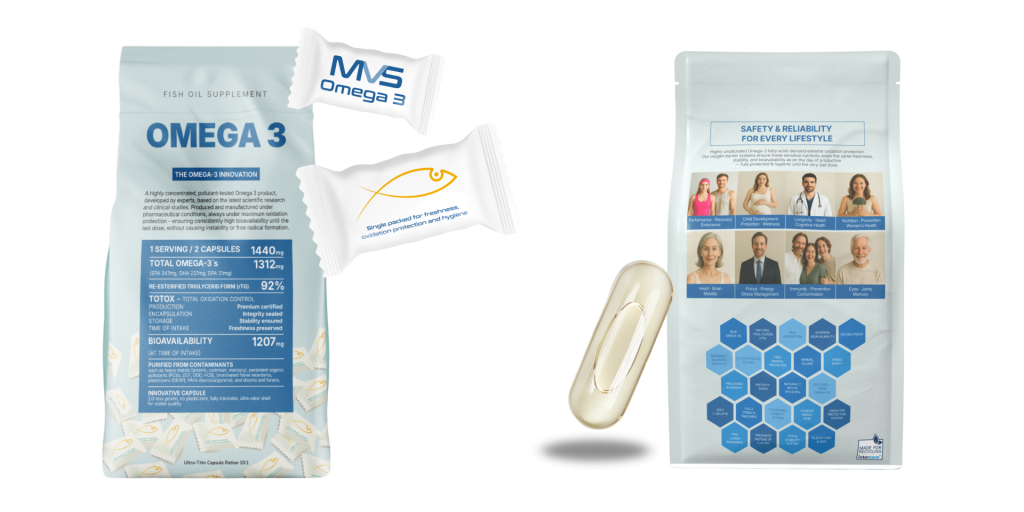Table of Contents
Introduction: Why Omega-3s Are Essential for Female Athletes
Women in sports face unique physiological challenges — from hormonal cycles and higher risk of joint injuries, to balancing endurance with strength, and managing recovery while preventing overtraining. Nutrition plays a central role in bridging these gaps, and among all nutrients, Omega-3 fatty acids (EPA and DHA) stand out.
In 2025, research shows Omega-3s are not only vital for general health but also for enhancing performance, recovery, hormonal balance, and injury prevention in women. This article explores the science behind Omega-3s, their unique benefits for female athletes, and how to choose the right supplement for consistent results.
What Are Omega-3 Fatty Acids? (Quick Refresher)
Omega-3s are essential polyunsaturated fatty acids that the body cannot make in sufficient amounts. They must be consumed through diet or supplements.
- ALA (Alpha-linolenic acid): Plant-based, from flax, chia, walnuts. Poorly converted to EPA/DHA (<5%).
- EPA (Eicosapentaenoic acid): Anti-inflammatory, supports cardiovascular health, mental resilience, and muscle recovery.
- DHA (Docosahexaenoic acid): Dominant in the brain and eyes, supports cognition, focus, reaction time, and hormonal health.
For women in sports, direct EPA and DHA intake from fish or algae is essential — ALA alone isn’t enough.
Why Women in Sports Need Omega-3s
- Higher injury risk: Women experience more ACL and joint injuries than men, partly due to hormonal differences and biomechanics.
- Hormonal fluctuations: Menstrual cycles, pregnancy, and menopause all influence recovery, energy, and inflammation.
- Bone health: Women are at higher risk of osteoporosis and stress fractures.
- Mental health: Anxiety, depression, and hormonal mood changes affect athletic consistency.
- Performance demands: Balancing endurance, strength, and recovery requires optimal nutrition.
Omega-3s provide a multifaceted solution for these challenges.

Key Benefits of Omega-3s for Women in Sports (2025 Evidence)
- Muscle Recovery & Reduced Soreness
- Exercise-induced muscle damage triggers soreness (DOMS).
- Omega-3s reduce inflammation and speed up healing.
- Recent studies (2023–2024): Women supplementing with 2 g/day EPA+DHA experienced less muscle soreness and improved recovery times, especially after high-intensity workouts.
- Benefit: Train more often and consistently with less downtime.
- Joint Health & Injury Prevention
- Female athletes are 2–8x more likely to suffer ACL injuries than men.
- Omega-3s support joint lubrication, cartilage protection, and reduced stiffness.
- Meta-analyses (2022–2024): Omega-3 supplementation improved joint mobility and reduced pain in athletes with repetitive strain.
- Benefit: Healthier joints, fewer injuries, better long-term performance.
- Muscle Growth & Strength
- Women often struggle with lean muscle retention, especially during calorie restriction.
- Omega-3s boost muscle protein synthesis (MPS) by enhancing mTOR signaling.
- Clinical trial (2022): Female athletes using Omega-3s gained more lean muscle mass compared to controls during resistance training.
- Benefit: Improved strength and lean muscle gains.
- Cardiovascular Endurance & VO₂ Max
- Endurance sports (running, cycling, swimming) demand high cardiovascular efficiency.
- Omega-3s improve blood flow, oxygen delivery, and heart rate recovery.
- Studies (2023): Women using Omega-3 supplements had higher VO₂ max and reduced fatigue in endurance events.
- Benefit: Greater stamina, endurance, and recovery between sets.
- Hormonal Health & Menstrual Cycle Support
- Omega-3s regulate prostaglandins, easing menstrual cramps and reducing PMS symptoms.
- They improve mood stability during hormonal fluctuations.
- Research (2024): Women with higher Omega-3 intake reported reduced menstrual pain and improved athletic consistency throughout cycles.
- Benefit: Balanced performance and reduced cycle-related disruptions.
- Bone Health & Injury Protection
- Women are at higher risk of osteoporosis and stress fractures.
- Omega-3s improve calcium absorption and bone mineral density.
- Meta-analysis (2023): Omega-3 supplementation reduced markers of bone loss in postmenopausal women.
- Benefit: Stronger bones, fewer fractures, safer training longevity.
- Mental Health, Focus & Cognitive Performance
- Female athletes often juggle training, work, and life stress.
- DHA supports brain membranes; EPA regulates neurotransmitters like serotonin.
- Clinical reviews (2023): High-EPA Omega-3s reduce anxiety and depressive symptoms, especially in women.
- Benefit: Sharper focus, faster reaction time, more stable mood.
- Pregnancy, Postpartum & Return to Sport
- For pregnant athletes, DHA is critical for fetal brain and eye development.
- Supports maternal mood and reduces postpartum depression risk.
- Safe supplementation helps athletes return to sport post-pregnancy with less joint pain and fatigue.
- Benefit: Healthier pregnancy outcomes and smoother postpartum recovery.
- Menopause & Healthy Aging in Athletes
- Menopause accelerates bone loss, joint pain, and fat gain.
- Omega-3s counteract inflammation, support bone health, and maintain lean mass.
- 2024 trials: Omega-3 supplementation reduced hot flashes and improved sleep in menopausal women.
- Benefit: Active aging with reduced inflammation and more energy.
– General wellness: 250–500 mg EPA+DHA/day.
– Active women/gym-goers: 500–1000 mg/day.
– Athletes in training: 1000–3000 mg/day (with medical guidance if higher doses).
– Pregnancy & postpartum: 200–300 mg DHA/day minimum.
Pro tip: Always take Omega-3 with meals containing fat for better absorption.
Food vs Supplementation
| Source | Pros ✅ | Cons ❌ |
|---|---|---|
| Food (Fatty Fish & Algae) | – Naturally nutrient-dense (protein, vitamin D, selenium, iodine). – Omega-3s in their natural triglyceride form, well absorbed. – Algae = vegan-friendly DHA source, safe during pregnancy. – Eating fish is linked to better cardiovascular and brain outcomes in population studies. | – Many women do not consume enough fish weekly to meet EPA/DHA needs. – Large fish (tuna, swordfish) may contain mercury, PCBs, dioxins, and microplastics. – Quality varies by sourcing and cooking method. – Difficult to track exact Omega-3 intake from food alone. |
| Supplements (Like MVS Omega-3) | – Deliver standardized doses of EPA/DHA (easy to track intake). – Purification removes heavy metals, PCBs, and toxins. – rTG form ensures superior absorption and stability. – Available in double-protection packaging, preserving freshness. – Convenient, portable, consistent — ideal for athletes & busy lifestyles. | – Many women do not consume enough fish weekly to meet EPA/DHA needs. – Large fish (tuna, swordfish) may contain mercury, PCBs, dioxins, and microplastics. – Quality varies by sourcing and cooking method. – Difficult to track exact Omega-3 intake from food alone. |
Why Quality Matters for Women in Sports
Form: rTG vs EE
- Ethyl ester (EE): cheap, poorly absorbed.
- Re-esterified triglyceride (rTG): closest to natural form, up to 70% better absorption.
- Best for ensuring Omega-3s reach muscles, joints, brain, and reproductive health systems.
Freshness & Oxidation
- Rancid oils = reduced benefits, fishy burps, possible harm.
- Fresh, low-oxidation Omega-3s ensure safety and performance benefits.
Packaging
- Bulk bottles: expose capsules to air, accelerating rancidity.
- Double protection packaging: individually sealed capsules in oxygen-proof pouches — the 2025 gold standard, implemented only by MVS Omega-3 currently.
MVS Omega-3 — Setting a New Standard in Purity, Stability, and Bioavailability
Developed by MVS Pharma’s medical and pharmaceutical experts, MVS Omega-3 represents a new generation of scientifically designed Omega-3 supplements. With a 92% natural rTG structure, verified bioavailability of 1207 mg, and our proprietary T-TOX™ oxidation control system, it ensures exceptional purity, stability, and absorption. Each batch meets European Pharmacopeia standards and is tested for over 20 potential contaminants — setting a benchmark for transparency and trust in modern nutritional science.

Not all Omega-3 supplements are created equal. The more unsaturated and effective Omega-3 molecules become, the more sensitive they are to air exposure — making oxidation protection the single most critical factor for preserving both safety and bioavailability. Once oxidation begins, oil turns rancid, loses efficacy, and may even generate free radicals.
At MVS Pharma, this challenge defined our mission. We engineered MVS Omega-3 as a next-generation formulation designed for uncompromised purity, verified stability, and maximum biological usability.
Key Facts:
- Pharma-Standard Purification & Testing — each batch is verified to meet European Pharmacopeia standards and is screened for over 20 contaminants, including heavy metals, PCBs, dioxins, PAHs, and plasticizers.
- 90% Purified Omega-3 Concentration — delivering 1440 mg total oil with 1312 mg active Omega-3s (EPA 784 mg, DHA 518 mg) per serving.
- 92% Re-esterified Triglyceride (rTG) Form — structurally identical to natural fish oil for superior absorption (1207 mg bioavailable) and full physiological compatibility.
- T-TOX™ Total Oxidation Control System — exclusive German oxidation-management technology ensuring freshness and molecular integrity from production to the last capsule.
- Innovative Double Packaging — Individually Sealed Protection. Each capsule is individually sealed in an oxygen-free, double-wrapped container filled with argon gas. This advanced protective solution shields the sensitive Omega-3 oil from oxidation, light, and moisture — preserving the purity, stability, and freshness of each capsule until the very last dose.
- Ultra Thin Capsule Release 3.0™ — 2/3 less gelatin, no plasticizers, and >91% active ingredient load for transparency, purity, and optimized payload.
- Natural Tocopherol Matrix (α, β, γ, δ) — balanced antioxidant system calibrated to protect high-purity oil without destabilization.
The result is an ultra-pure, oxidation-protected Omega-3 supplement that maintains its natural structure, freshness, and full efficacy until the final dose — ensuring consistent support for cardiovascular, cognitive, visual, and immune health.
Summary: Why Women Athletes Should Prioritize Omega-3
Omega-3s are not just general wellness supplements — they are performance enhancers for women in sports. In 2025, research confirms that Omega-3s:
- Reduce muscle soreness and speed up recovery.
- Protect joints and bones.
- Enhance muscle growth and fat metabolism.
- Improve endurance and cardiovascular performance.
- Support hormonal balance, menstrual health, and pregnancy.
- Boost mental focus and resilience.
- Help athletes stay active and strong through menopause and beyond.
With the right form (rTG), freshness (low oxidation), and packaging (double protection), Omega-3s become a game-changer for female performance, health, and longevity in sport.
Disclaimer: As a service to our readers, MVS Pharma GmbH publishing provides access to our library of archived content in our blog. Please note the date of the last review or update on all articles. No content on this site should ever be used as a substitute for direct medical advice from your doctor or other qualified clinician.
FAQs
-
Why are Omega-3s important for women in sports?
They support recovery, joints, hormones, bones, endurance, and focus.
-
Do women need different Omega-3 doses than men?
General ranges are similar, but women may need extra support during pregnancy, postpartum, and menopause.
-
Can Omega-3s help with menstrual cramps?
Yes. They reduce prostaglandins, easing cramps and PMS symptoms.
-
Are Omega-3s safe during pregnancy?
Yes, when purified and contaminant-free. DHA is especially critical for fetal development.
-
How do Omega-3s support bone health?
They reduce bone breakdown, improve mineral density, and lower fracture risk.
-
What form of Omega-3 is best absorbed?
Re-esterified triglyceride (rTG) form, such as the one used in MVS Omega-3.
-
How do I avoid rancid oils?
Choose brands with published oxidation values and double-protection packaging.
-
What makes MVS Omega-3 different?
It offers oxidation resistance, superior absorption in rTG form, full safety testing, and double protection packaging — ensuring purity and potency from production to consumption.
Sources:
- National Library of Medicine document – “Omega-3 Polyunsaturated Fatty Acids: Benefits and Endpoints in Sport”
- National Library of Medicine document – “Recent Clinical Trials Shed New Light on the Cardiovascular Benefits of Omega-3 Fatty Acids”
- National Library of Medicine document – “The Influence of Omega-3 Fatty Acids on Skeletal Muscle Protein Turnover in Health, Disuse, and Disease”
- National library of medicine – “Effects of Omega-3 Fatty Acid Supplementation on Skeletal Muscle Mass and Strength in Adults: A Systematic Review”
- National library of medicine – “Effects of Omega-3 Fatty Acids on Immune Cells”
- National library of medicine – “Beneficial Outcomes of Omega-6 and Omega-3 Polyunsaturated Fatty Acids on Human Health: An Update for 2021”
- Science Direct – “Omega-3 long-chain polyunsaturated fatty acids: Metabolism and health implications”


